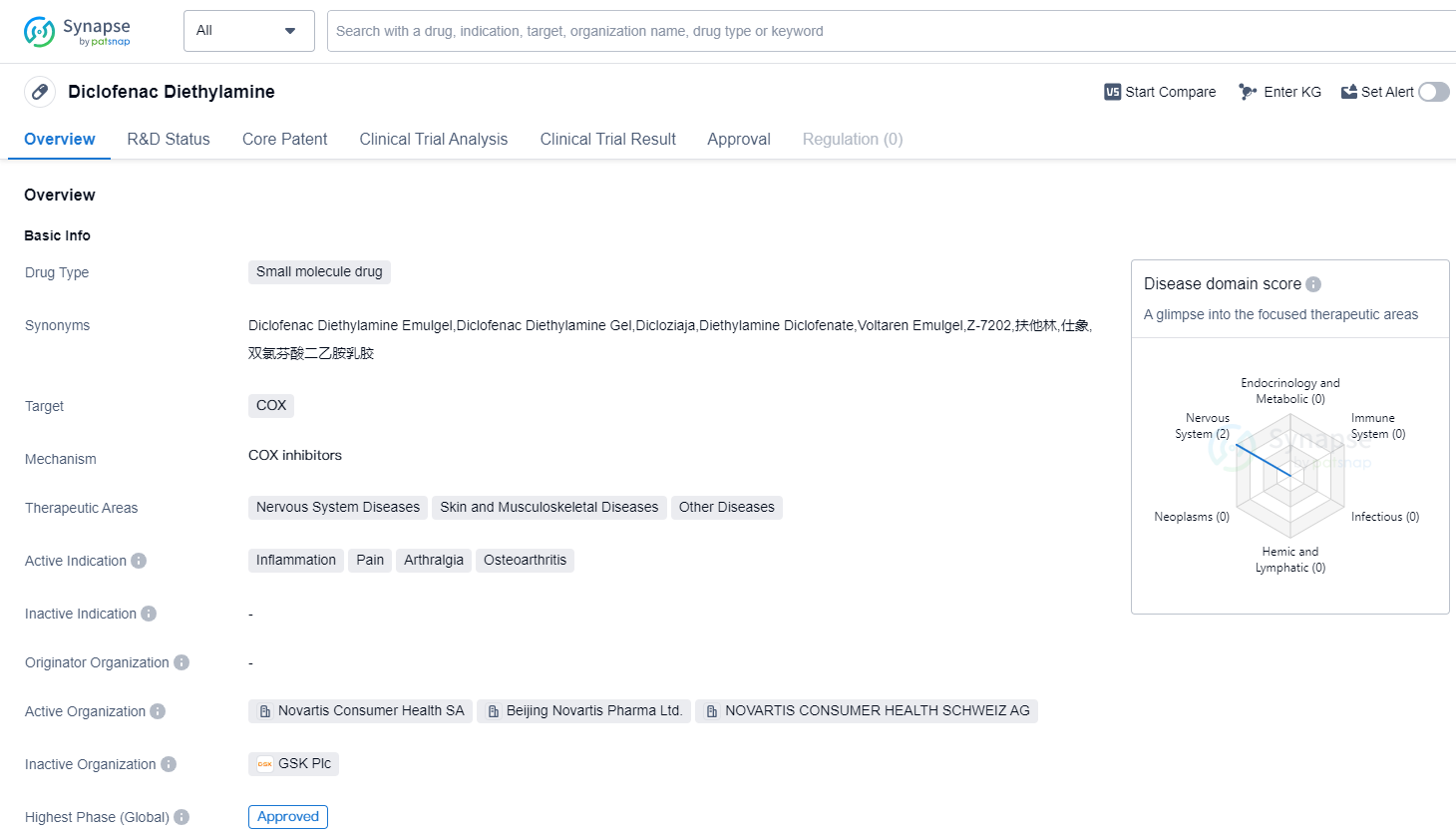diclofenac diethylamine: Detailed Review of its Transformative R&D Success
Diclofenac diethylamine's R&D Progress
Diclofenac Diethylamine is a small molecule drug that belongs to the nonsteroidal anti-inflammatory drug (NSAID) class. It primarily targets the enzyme cyclooxygenase (COX), which plays a crucial role in the production of prostaglandins, responsible for inflammation and pain.
This drug has been approved for use in various therapeutic areas, including Nervous System Diseases, Skin and Musculoskeletal Diseases, and Other Diseases. It is commonly prescribed to alleviate symptoms associated with inflammation, pain, arthralgia (joint pain), and osteoarthritis.
Diclofenac Diethylamine has reached the highest phase of development which is approved globally. Its first approval was granted in the United States in June 1988, making it a well-established and widely used medication.
As a small molecule drug, Diclofenac Diethylamine is chemically synthesized and typically administered orally or topically. It is known to inhibit the activity of COX enzymes, thereby reducing the production of prostaglandins and subsequently alleviating inflammation and pain.
The drug's approval in multiple therapeutic areas suggests its versatility and effectiveness in treating various conditions. Nervous System Diseases encompass a wide range of disorders affecting the brain, spinal cord, and nerves, while Skin and Musculoskeletal Diseases involve conditions affecting the skin, muscles, and bones. The drug's efficacy in treating Other Diseases indicates its potential in addressing ailments beyond the commonly associated indications.
Diclofenac Diethylamine's long history of approval and use since 1988 highlights its established safety profile and efficacy. Its widespread availability and approval in global markets further emphasize its importance and acceptance in the pharmaceutical industry.
👇Please click on the image below to directly access the latest data (R&D Status | Core Patent | Clinical Trial | Approval status in Global countries) of this drug.
Mechanism of Action for diclofenac diethylamine: COX inhibitors
COX inhibitors are a type of medication that inhibit the activity of cyclooxygenase (COX) enzymes. COX enzymes are responsible for the production of prostaglandins, which are chemical messengers involved in inflammation, pain, and fever. By inhibiting COX enzymes, COX inhibitors reduce the production of prostaglandins, thereby providing relief from pain, inflammation, and fever. These medications are commonly used to treat conditions such as arthritis, menstrual cramps, and acute pain. COX inhibitors can be classified into two types: COX-1 inhibitors and COX-2 inhibitors. COX-1 inhibitors block both COX-1 and COX-2 enzymes and can cause side effects such as stomach ulcers and bleeding. On the other hand, COX-2 inhibitors selectively target the COX-2 enzyme and are associated with a lower risk of gastrointestinal side effects. It is important to note that the use of COX inhibitors should be done under medical supervision due to potential side effects and interactions with other medications.
Drug Target R&D Trends for diclofenac diethylamine
COX, or cyclooxygenase, is an enzyme that plays a crucial role in the human body's inflammatory response. It is responsible for the production of prostaglandins, which are hormone-like substances involved in various physiological processes. COX exists in two isoforms, COX-1 and COX-2. COX-1 is constitutively expressed and involved in maintaining normal bodily functions, such as protecting the stomach lining and regulating blood clotting. On the other hand, COX-2 is induced during inflammation and is primarily responsible for the production of prostaglandins that cause pain, fever, and swelling. Understanding the role of COX has led to the development of drugs called COX inhibitors, which are used to manage pain, inflammation, and other related conditions.
According to Patsnap Synapse, as of 13 Sep 2023, there are a total of 598 COX drugs worldwide, from 597 organizations, covering 312 indications, and conducting 8105 clinical trials.
The analysis of the target COX reveals a competitive landscape with multiple companies actively involved in research and development. GSK Plc, Viatris Inc., and Pfizer Inc. are the leading companies with the highest number of approved drugs. The focus of research and development is primarily on addressing indications such as pain, common cold, and rheumatoid arthritis. Small molecule drugs are the most rapidly progressing drug type, indicating their significance in the development of drugs targeting COX. China, the United States, and Japan are the countries/locations with the fastest development under the target COX, with China showing significant progress. Overall, the target COX presents opportunities for further research and development, particularly in addressing pain-related indications and exploring the potential of small molecule drugs.
👇Please click on the picture link below for free registration or log in directly if you have a freemium account, you can browse the latest research progress on drugs, indications, organizations, clinical trials, clinical results, and drug patents related to this target
Conclusion
In summary, Diclofenac Diethylamine is a small molecule drug that targets COX enzymes and is approved for use in various therapeutic areas, including Nervous System Diseases, Skin and Musculoskeletal Diseases, and Other Diseases. It effectively addresses inflammation, pain, arthralgia, and osteoarthritis. With its first approval in the United States in 1988, this drug has gained global recognition and is widely used in the pharmaceutical industry.






